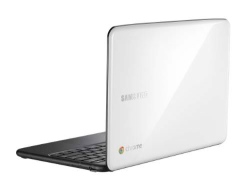 Yesterday was the first day of school for Grace Lutheran School in Oshkosh, Wisconsin. Among the various tasks that the students had to accomplish today were establishing their Google accounts and setting up their new Chromebooks. There's already a certain excitement that comes with a new school year, but according to principal Peter Iles, the students' reaction to the Chromebooks was "pretty magical." Several told him it was their favorite part of the day and the thing they were most looking forward to using for the rest of the academic year. That's a ringing endorsement for Google's new venture into hardware, sure, but it's also a great attitude to start the school year.
Yesterday was the first day of school for Grace Lutheran School in Oshkosh, Wisconsin. Among the various tasks that the students had to accomplish today were establishing their Google accounts and setting up their new Chromebooks. There's already a certain excitement that comes with a new school year, but according to principal Peter Iles, the students' reaction to the Chromebooks was "pretty magical." Several told him it was their favorite part of the day and the thing they were most looking forward to using for the rest of the academic year. That's a ringing endorsement for Google's new venture into hardware, sure, but it's also a great attitude to start the school year.
Grace Lutheran is one of many schools that is taking advantage of the new Chromebooks for Education program, announced earlier this summer at Google I/O. For $20 per month per device, schools can rent the netbook-like, Web-only devices. There have been lots of criticisms of the Chromebooks from tech bloggers -- they are underpowered computers for the price. But according to Iles, Chromebooks were the logical choice for his school.
The Grace Lutheran computer lab was woefully out-of-date. The machines were six or seven years old. To refresh the lab with new desktop computers would have cost around $35,000, not including all the software and licensing. To replace the old desktops with laptops would have cost about $15,000, again plus software costs, according to Iles. Instead, he opted to go with the Chromebooks -- 20 of them will run his school about $14,000. But as the Chromebooks are rented, not purchased, that's a monthly bill, and Iles said that it was far easier for the school to handle a small monthly payment than come up with a big chunk of money at once.
And just as importantly, perhaps, the Chromebooks were easier for Iles to administer and support. He's the principal, the seventh and eighth grade teacher, and the school's head of technology. He describes himself as "pretty computer savvy," but he confesses he just couldn't maintain a server environment. With Chromebooks plus Google Apps for Education, he doesn't have to.
In contrast, the staff at The Fessenden School in West Newton, Massachusetts operate with a bigger budget and their school's new Chromebooks will supplement rather than replace exisiting Macbooks and desktops. But the argument for the ease-of-use on the end of IT administration is the same: with Chromebooks, as with Google Apps for Education, there's no need to handle software and OS updates on each individual machine. There's no need to run a server on the premises.

